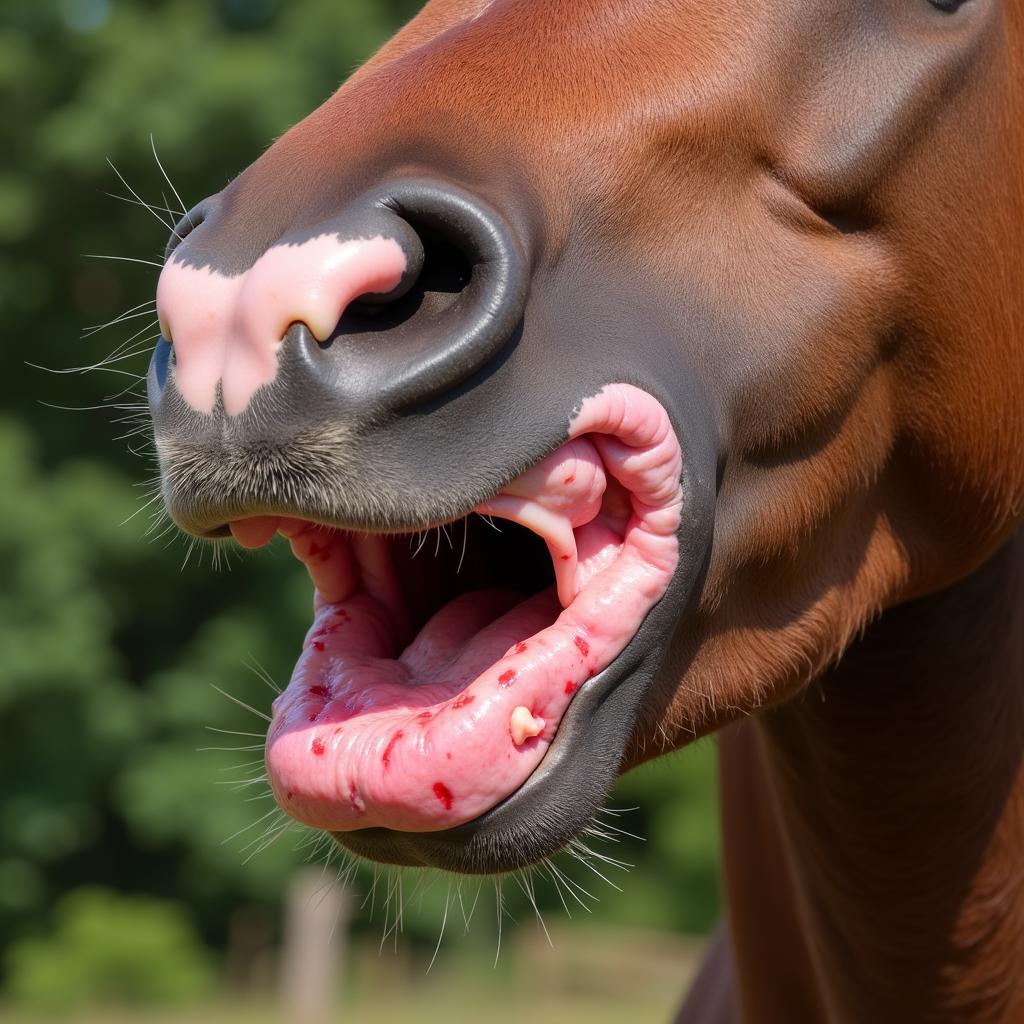A Horse Mouth Abscess can be a painful and concerning issue for any horse owner. In this comprehensive guide, we’ll delve into the causes, symptoms, and treatment of horse mouth abscesses, providing you with the knowledge you need to ensure your horse’s well-being.
What is a Horse Mouth Abscess?
A horse mouth abscess is a localized collection of pus within the tissues of the horse’s mouth. These abscesses can occur in various locations, including the gums, cheeks, palate, or even the tongue. They are often painful and can interfere with a horse’s ability to eat and drink comfortably. Several factors can contribute to the development of a horse mouth abscess, including dental problems, injuries to the mouth, and infections. Understanding these underlying causes is crucial for effective treatment and prevention.
Causes of Horse Mouth Abscesses
Several factors can contribute to the development of abscesses in a horse’s mouth. Dental problems, such as sharp enamel points or impacted teeth, are common culprits. These issues can irritate the soft tissues of the mouth, creating an entry point for bacteria and leading to infection. Injuries, such as bites or punctures from foreign objects like sticks or thorns, can also cause abscesses. In some cases, infections can spread from other areas of the body to the mouth. The presence of foxtails can also cause irritation and infection in the horse’s mouth, eventually leading to abscess formation. This is particularly concerning as foxtails can migrate and embed themselves deeply within the tissues, making treatment more challenging. You can read more about foxtails in horses on our website which covers foxtail horses.
Symptoms of a Horse Mouth Abscess
Recognizing the signs of a horse mouth abscess is essential for prompt treatment. Common symptoms include swelling in the affected area, drooling, difficulty chewing, loss of appetite, and foul odor from the mouth. Horses with mouth abscesses may also exhibit signs of pain, such as head tossing, reluctance to be bridled, or difficulty opening their mouth. In some cases, the abscess may rupture, releasing pus and providing temporary relief. However, veterinary attention is still necessary to ensure proper healing and prevent complications. Learn more about the structure of the horse jaw to understand how abscesses can impact this area.
 Horse Showing Symptoms of a Mouth Abscess
Horse Showing Symptoms of a Mouth Abscess
Treating a Horse Mouth Abscess
Treatment for a horse mouth abscess typically involves draining the pus and addressing the underlying cause. Your veterinarian may lance the abscess to allow for drainage or prescribe antibiotics to combat infection. In some cases, flushing the affected area with antiseptic solutions may be necessary. If dental problems are contributing to the abscess, dental work, such as floating or extraction, may be required. For infections requiring antibiotic treatment, Uniprim is a common choice. It’s essential to consult with your veterinarian regarding the appropriate uniprim dosage for horses.
“Prompt veterinary care is crucial for treating horse mouth abscesses,” advises Dr. Emily Carter, DVM. “Early intervention can minimize discomfort and prevent complications.”
How to Prevent Horse Mouth Abscesses
Prevention is always better than cure. Regular dental checkups are crucial for maintaining your horse’s oral health and preventing dental problems that can lead to abscesses. Providing a safe environment free of foreign objects and sharp objects is also important. Ensure that pastures are free of hazardous plants and debris. Inspect your horse’s mouth regularly for any signs of injury or abnormality. Understanding the anatomy of the horse cheek can help you identify potential problem areas.
Conclusion
Horse mouth abscesses, while potentially painful, are often treatable with proper veterinary care. Understanding the causes, symptoms, and treatment options can help horse owners recognize and address this issue promptly, ensuring their horse’s comfort and well-being. Regular dental care and a safe environment are crucial for preventing horse mouth abscesses. Recognizing the signs early and seeking veterinary attention can prevent complications and ensure a swift recovery. A horse mouth abscess can be a concerning issue, so early detection and treatment are key for a good outcome. Explore the link about the foxtail horse for more information about foxtails and their potential impact on your horse’s health.
FAQ
- What are the most common signs of a horse mouth abscess?
- Can a horse mouth abscess heal on its own?
- How long does it take for a horse mouth abscess to heal?
- What is the best way to prevent horse mouth abscesses?
- Can a horse mouth abscess be contagious to other horses?
- What should I feed my horse if it has a mouth abscess?
- What are the potential complications of an untreated horse mouth abscess?
Common Scenarios and Questions:
- Scenario: My horse is drooling excessively and not eating. Could it be a mouth abscess?
- Question: My horse has a swelling on its cheek. How can I tell if it’s an abscess or something else?
Related Resources on Justus Horses USA:
- Check out our article on equine dental care for more tips on maintaining your horse’s oral health.
- Learn more about common horse health issues and their treatments.
Need Help? Contact Us!
For any questions or concerns regarding your horse’s health, please don’t hesitate to contact us.
Phone: 0772127271
Email: [email protected]
Address: QGM2+WX2, Vị Trung, Vị Thuỷ, Hậu Giang, Việt Nam
Our customer support team is available 24/7 to assist you.